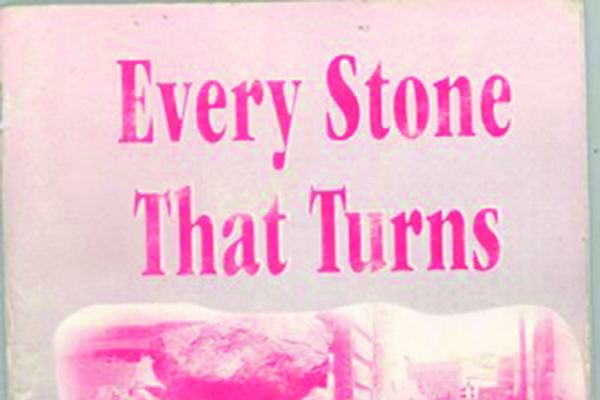
IN 1999, Thomas Bvuma published an anthology that offered a reflection of the post-independence euphoria and disappointment. The anthology has stood the test of time because of its honest perspectives.
Author: Thomas S Bvuma Title: Every Stone That Turns Publisher: College Press Publishers (1999) ISBN: 1-77900341-2
It opens with the piece, The Snake Never Stirs, which sets the tone for the anthology’s somewhat futurist predictions of a dysfunctional economy. It hints at promises that are made and not realised at a centre stage, leaving people in unending queues behaving like “hungry mongrels”.
Faced with a case, where the most appraised have been the survivors, Bvuma poses the haunting question: “The real heroes, are they not the dead?” in the poem, Survivors.
The anthology also illuminates post-war disillusionment and disappointment in the case of the freedom fighters. This comes out in Petals of the Unknown when the persona hints, “the son owns no sod of soil,” without any land either in Borrowdale or Budiriro, or even a name written in honour or in history.
The poet, however, puts some of the blame on the “liberators” themselves when he explicitly amounts their current passivity to self-castration in the poem, We Surrendered Our Balls. He shows that when the guerillas submitted their guns in the disarmament phase, they also lost their critical voice and hence they are now living and suffering like villains.
The belt of disillusionment moves on to the national discourse and it also becomes confrontational in tone, as Bvuma keeps on employing juxtaposing techniques and rhetorical questions to bring an evaluation of the promised outcome of the war and the here and the now.
This is quite evident in the piece, Years After, which is brutal as it asks a question that is not allowed to be asked even now. The persona asks: “So many years after/the stones and revolutions/how much grain have we gathered into grandmother’s granary.”
- Chamisa under fire over US$120K donation
- Mavhunga puts DeMbare into Chibuku quarterfinals
- Pension funds bet on Cabora Bassa oilfields
- Councils defy govt fire tender directive
Keep Reading
Like Hove in Bones, Bvuma also explores how it felt to have a son involved in the war. The pain that comes out of it to a mother whose umbilical code yearns to know whether its beloved product is safe or not.
How mothers went to the towns in search of their children, only to hear that they are either dead or alive, but with mental or physical incapacitations is explored in the poem, Smile Mother, as Bvuma seeks to play the role of healer in a daunting world of unlikable outcomes, fighting for a war that only a few individuals would savour its fruit.
Still on the disruption of the family unit in the face of war, Bvuma bemoans the death of the persona’s sister after she was shot by a stray bullet from a Rhodesian soldier. Free Sod For My Sister captures the feelings of loss and the disgust the system of war as an elixir to the birthing of a new product.
He summarises the liberation struggle in the poem, Grabbing the Bull: “Finally/he played leading actor/producer and director/the script/albeit/he did not write.” This illuminates the opportunism that characterised the rise to power of some individuals.
The title Grabbing the Bull carries heavy weight along tribal lines on the history of the nation in the liberation and post-independence war narrative of Zimbabwe.
Bvuma’s pen then manoeuvres towards social criticism as seen in How Can I Weep. Like in Charles Mungoshi’s story Shadows on the Wall — off the anthology, Coming of the Dry Season —the persona is a boy who has been brought up in a hardened manner and now no longer shows any emotion, even at the passing on of his father.
Bvuma shows how an orientation in upbringing children can have undesirable outcomes that have got negative impacts on both the parent and the child’s interaction with the world.
To Bvuma, war brought with itself a mixed bag of fortunes as the title poem Every Stone That Turns shows that, apart from the disappointment that most faced, the war catapulted some from the bush to shopping malls and five-star hotels. And such is the reality.
He also lambasts the “wafa wanaka” narrative in the poem Good Citizen. Men of cloth are portrayed to be using the funeral to lure new congregants whilst politicians use it as a campaign rally to garner votes and relatives are no exceptions.
And one of the biggest recurring subjects of the anthology is the poet’s loss of Yeukai. Yeukai is the lover who is left by the persona because he has to go to war, and to serve the cause. However, when the persona returns, he discovers that, Yeukai is already Warming Another Man’s Groin.
This disappointment that haunts the persona even after landing a dream job, is characteristic of many fictitious works set in this period and can be deemed as also prophetic.
lFeedback: benmunengwa.gmail.com











